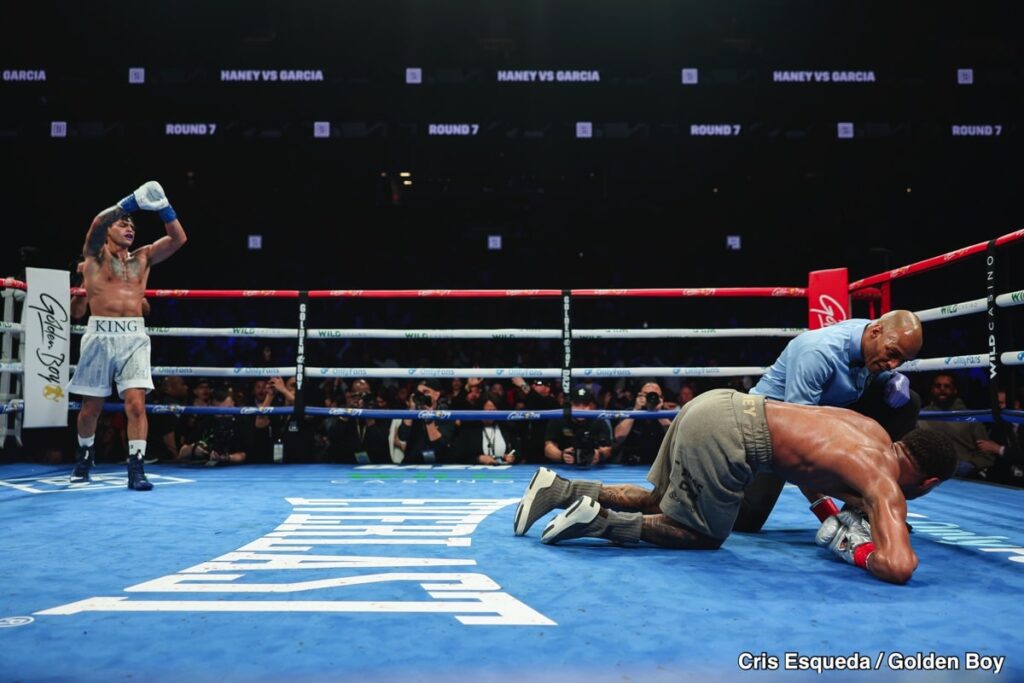Former multi-weight world champion Jorge Linares believes Devin Haney should move back to 135 pounds to rehabilitate his career following his loss to Ryan Garcia.
Linares feels Haney isn't built to compete at 140 pounds because he doesn't have the punching endurance or power to compete with the top fighters in that division. He believes Haney (31-0, 15 KOs) should make the sacrifices to drop in weight and get back to his best rank of 135 pounds.
The challenges of returning to 135
What keeps Haney from returning to 135 is how much weight he gains between fights. Haney puts on weight and looks bigger when he's not in training camp. For Haney to get back to 135, he'll need to keep his weight under control between fights, avoid fattening foods, and continue to train to stay close to his fight weight.
Haney lost a 12-round majority decision to Ryan on April 20, suffering multiple knockdowns during the bout. His performance against Ryan showed he is not a good fit in the 140-pound division and will continue to have issues there if he chooses to stay there.
“The new generation doesn't think so much about weight and sacrifices. Boxing isn't what it used to be,” Jorge Linares told YSM Sports Media in reaction to Ryan Garcia's failure to make weight for his April 20 bout against Devin Haneyon.
“Ryan Garcia's situation is not professional in terms of doping and the weight. Haney, I think he needs to go down to 135 pounds, that's best. If he stays at 140, there are a lot of boxers who have more punching power than him and he doesn't have the chin,” Linares said.
Haney would be much better off going back to 135, as he has no future at 140. Moving up to 147 and fighting the best in the division would be an immediate end to his career, as Haney would likely only last a round or two against someone like Jaron “Boots” Ennis.
The future at 135: More opportunities for Haney
A move back to 135 pounds would put Haney in position to fight Gervonta “Tank” Davis, Vasiliy Lomachenko or Shakur Stevenson for money. Haney has better opportunities at lightweight than he does at the now-defunct 140. Ryan Garcia will never make it to 140 again, and Teofimo Lopez's popularity has plummeted and he looks to be done.
“Ryan Garcia has a stronger chin than Haney and Ryan has the punching power, but Haney doesn't have the chin and he doesn't have the punching power,” Linares said matter-of-factly. “It's tough for him right now because the new generation, the new kids, the new fighters, they're not willing to sacrifice too much in weight,” Linares said of Haney's struggles to make 135 pounds.
Weight management is key
Haney can return to 135 if he is disciplined, but he can't do it if he rapidly gains weight between fights like he has in the past. He's not athletic outside of camp. Haney won't have the strength or ability to withstand the hard punches of a 140-pound fighter.
At least at 135 pounds, Haney will have the size to beat fighters he never would have been able to beat if he had been fighting fighters of his equal or at least close to his weight at 140 pounds.
“It's like, 'Oh yeah, I'll make 140 pounds. It'll be easier for me.' You have to make sacrifices to make weight, but if you make those sacrifices you have a better chance of winning the fight,” Linares said.
Haney could have still fought at 135 pounds and still be undefeated instead of losing.
“I started my career at 126 pounds, then I changed to 130 because my build was different, then I changed to 135. When I changed to 140, I made a mistake because I'm in the United States and the food is totally different from Japan,” Linares said.
“So I thought, 'It's easier to make 140 pounds.' I can't win at 140 pounds, I'm going to lose my 140-pound fights. It was very difficult for me to make a career at 140 pounds, with so many big guys at 140 pounds, so now boxers are reluctant to make that weight. Look at Ryan Garcia as a bad example,” Linares said.
Ryan looks to have bulked up a lot since his fight with Haney and gaining too much weight during his one-year suspension could be an issue. He and Haney will need to commit to training and cut back on food throughout the year. With the money Haney makes, he could hire a cook and nutritionist to prepare his meals and diet, and someone to train him between fights.
“There are a lot of boxers out there now who like to attack hard, and they take their time to recover. [rehydrate] “I don't like boxers who weigh over 10 pounds. It's dangerous,” Linares said of exploiting a system in which overweight boxers fight at a weight much lighter than their size and then supplement with massive amounts of weight, 20 or more pounds, to gain an advantage over smaller opponents.
Sanctioning bodies could immediately end the practice of fighters fighting outside their weight class by implementing a strict 10-pound hydration limit. So far, only the IBF has done so, while the other three sanctioning bodies are lagging behind.



